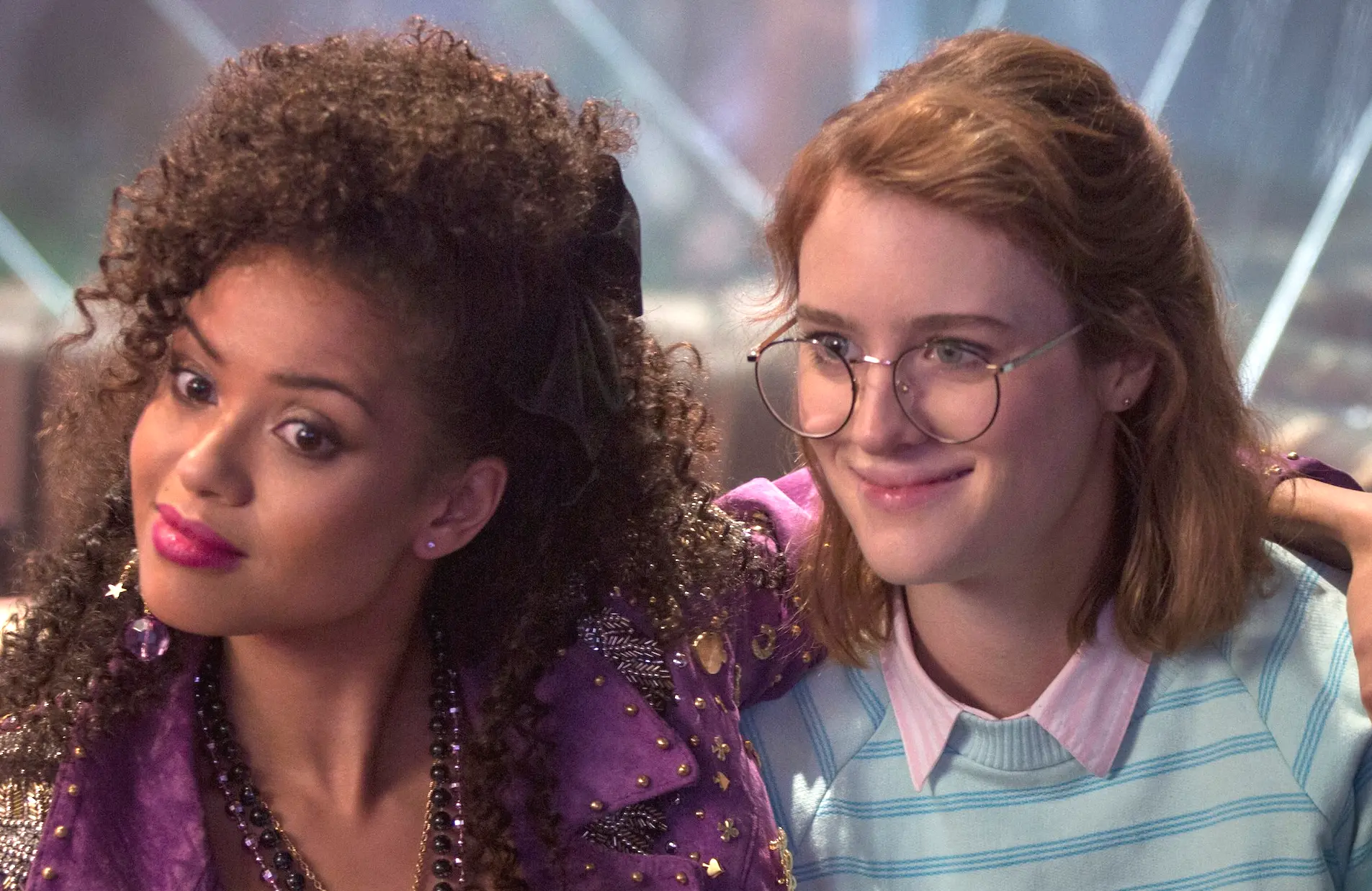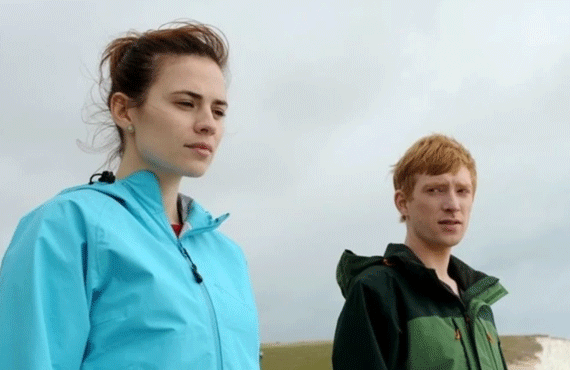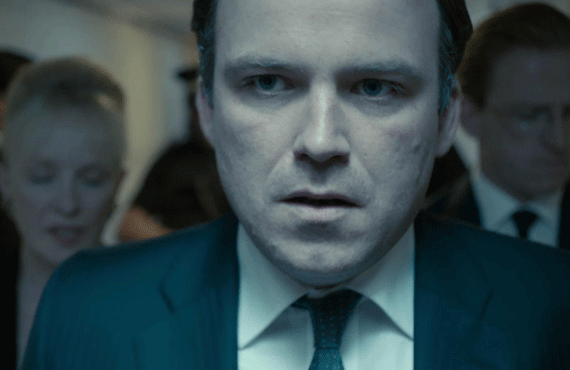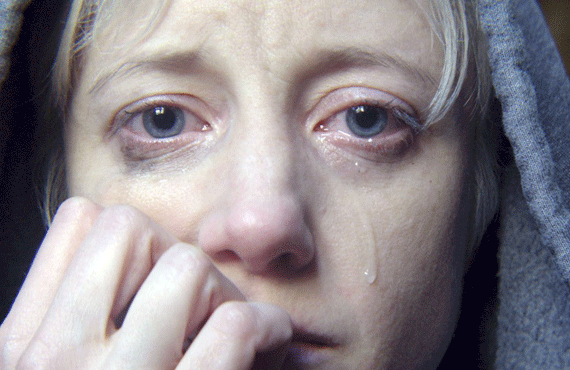Every Black Mirror Episode, Sorted by Bleakness
-
 Gugu Mbatha-Raw and MacKenzie Davis in the "San Junipero" episode of Black Mirror (Netflix)
Gugu Mbatha-Raw and MacKenzie Davis in the "San Junipero" episode of Black Mirror (Netflix)Nobody is going to mistake Black Mirror for an uplifting show. With very few exceptions, this anthology series’ raison d’etre is showing us how technology is probably going to transform our world into a dystopian hellscape. But exactly how dystopian varies wildly from episode to episode: some stories leave a tiny glimmer of hope for a brighter future, while others leave you pondering the futility of life for days on end.
If you’re feeling like revisiting some (or all) of the series, it may be helpful to plan ahead, so you can decide if you want your entire week ruined or whether it’s better to be depressed for only an hour or two. With that in mind, we’ve classified every episode by approximate levels of bleakness. (Warning: Spoilers ahead, especially if you haven’t seen the three new Season 5 episodes that dropped this week.)
Not at All Bleak
Striking Vipers (Series 5, Episode 1): Black Mirror has us all so conditioned to expect the worst from any given near-future scenario that when this comparatively lighthearted meditation on masculinity and male friendships (starring MCU familiars like Anthony Mackie and Pom Klementieff) resolves with everyone working out their problems (instead of dying), it's nearly as jarring as the denouement of any other episode. Also, the line about the polar bear (not to mention the double entendre in the title) is easily one of the funniest of the entire series.
San Junipero (Series 3, Episode 5): By far the series’ most beloved episode, San Junipero preserves all of the framework of a typical Black Mirror episode, and even plays with concepts the show previously considered in darker episodes like Be Right Back and White Christmas, but instead of leaving you wondering how technological advancements will ruin your life, it posits that maybe they’ll enable your ultimate happy ending, as it does for Mackenzie Davis and Gugu Mbatha Raw’s couple.
Hang the DJ (Series 4, Episode 4): While San Junipero hogs the spotlight when it comes to sweet, hopeful Black Mirror moments, Hang the DJ is secretly the sweetest and most hopeful episode by dint of the fact that it brings its principals together without having to also grapple with their mortality.

Kind of Bleak
Be Right Back (Series 2, Episode 1): Okay, Hayley Atwell keeping her dead husband Domhnall Gleeson’s robot clone in the attic is definitely disturbing, and obviously the various metaphors for processing grief don’t make this a particularly happy story, especially on a rewatch. Still, on balance, this one is more sweetly sad than purely hopeless.
Arkangel (Series 4, Episode 2): The moral of this story is that things could get very bleak for parents (Rosemarie DeWitt, in this case) who can’t make themselves shut off the baby monitor, and while it certainly raises some disturbing implications about privacy and censorship, White Christmas ultimately does that whole erasing-undesirable-objects-from-your-field-of-vision thing in a much more upsetting way.
The Entire History of You (Series 1, Episode 3): Like Arkangel, this episode hints at a future that could be awful for people who let their mistrust of their loved ones consume them. That said, the technology in this universe appears to be something you could absolutely opt out of (though perhaps not in the way the protagonist does).
Rachel, Jack & Ashley Too (Series 5, Episode 3): Black Mirror’s favorite trope, the “synaptic snapshot,” is used here to explore the dark side of fame and the creative process, and while Ashley’s captors employ some methods that are pretty creepy, as the story unfolds, there’s rarely any doubt that Ashley and her robot clone will emerge triumphant one way or another. That said, the bleakest thing in the entire Black Mirror series is Miley Cyrus performing a cover of "Head Like a Hole."
USS Callister (Series 4, Episode 1): Daly (Emmy-nominated Jesse Plemons) is one of the series’ most memorably creepy villains, and the prison he’s created for his perceived enemies is truly horrifying to ponder, but a triumphant ending and numerous lighthearted jabs at Star Trek give the dark premise a soft, chewy center.

Medium Bleak
The National Anthem (Series 1, Episode 1): It’s worth noting that before Black Mirror made it to Netflix, it was basically known as “that show where the Prime Minister schtups a pig,” and it set the tone for the series as a place where horrific, dark, and thought-provoking scenarios play out. But while things certainly didn’t work out well for Rory Kinnear’s Prime Minister (or the pig), the series has certainly traveled to far darker places since its deeply weird debut.
Nosedive (Series 3, Episode 1): Nosedive makes you weep for humanity a little harder when you consider that similar people-rating systems are already being rolled out in parts of China, but the sheer glee of Bryce Dallas Howard during Lacie’s final scenes -- first her wedding breakdown, then the aftermath -- makes the whole package too much fun to be a total downer.
Bandersnatch (Special): Black Mirror’s first foray into interactive storytelling would certainly be bleaker if the user couldn’t occasionally shatter the fourth wall entirely or compel Stefan to build a half-assed (and poorly-reviewed) version of his game without murdering anyone, but since you can’t opt into a truly happy ending either, here we are.
Fifteen Million Merits (Series 1, Episode 2): Between the gray sweatsuits and the Cuppliance, no other episode goes to a dystopia that’s quite as Huxley-esque as this one, but at least Bing gets one over on his overlords before succumbing to his gilded cage.
Smithereens (Series 5, Episode 2): A relatively by-the-numbers hostage standoff takes a depressing turn when you learn the backstory of the perpetrator (Andree Scott), but the truly bleak part comes when you realize that every single social-media tidbit it’s based on, from the eavesdropping to the dopamine metrics to your social media knowing more about you than the cops do, is actually possible (and could be happening already, to some extent). Deleting your Twitter account may or may not make you feel better.

Extremely Bleak
White Christmas (Special): Of all of Black Mirror’s numerous takes on transferring human consciousness into an inanimate object, this one feels the most punishing and isolating due to the way it plays with the characters’ perception of time.
Playtest (Series 3, Episode 2): Is Wyatt Russell losing his memories? Is he dead? Is he hallucinating? Is he hallucinating his death? The endings-within-endings, each one darker and more upsetting than the next, make this Total Recall homage a tough watch.
The Waldo Moment (Series 2, Episode 3): This one perhaps played a little bit lighter before the days of Cambridge Analytica and deep fakes, but these days it seems all too possible for a cartoon character to torpedo an election.
Hated in the Nation (Series 3, Episode 6): The idea of being killed for a viral tweet is chilling on its face, and certainly this one wins in terms of sheer body count, but if the method of death were something a little less silly than robot bees, it would probably be marginally more upsetting.
Metalhead (Series 4, Episode 5): The heart-pounding, ultimately futile race against rogue robot canines is incredibly chilling... right up to the moment we discover what it’s all for, and then feel a little dumb for having gotten invested.

Maximum Bleak
Crocodile (Series 4, Episode 3): Murdering a blind baby to cover up a crime is pretty much the darkest thing that anyone’s ever done on this extremely dark series, and the fact that this episode compels the viewer to sympathize with a truly terrible person before yanking the rug out from under absolutely everyone (a favorite Black Mirror trope) is the icing on the cake.
Men Against Fire (Series 3, Episode 5): Active combat zones are rarely a place to go for warm fuzzies, but when this story reveals its big twist, it manages to take the idea of war to a new level of hopelessness.
Black Museum (Series 4, Episode 6): While the ending is somewhat cathartic, the path it takes in getting there is utterly brutal, and the fact that we’re presented with a trilogy of stories along the way, rather than just one, triples the bleakness.
Shut Up and Dance (Series 3, Episode 3): The protagonist’s increasing desperation as his assigned tasks get more and more upsetting makes this episode actively stressful to watch, and that’s all before the crushing, breathtaking reveal at the end.
White Bear (Series 2, Episode 2): Just like in Shut Up and Dance, the device of forcing the viewer to empathize with a character being emotionally brutalized, and then revealing how they “earned” the treatment, is a total gut-punch.
People are talking about Black Mirror in our forums. Join the conversation.
Jessica Liese has been writing and podcasting about TV since 2012. Follow her on Twitter at @HaymakerHattie.
TOPICS: Black Mirror, Netflix, Andrew Scott, Miley Cyrus, Lists